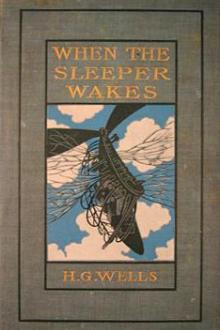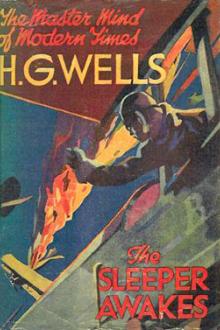The Sleeper Awakes<br />A Revised Edition of When the Sleeper Wakes, H. G. Wells [e novels for free TXT] 📗

- Author: H. G. Wells
Book online «The Sleeper Awakes<br />A Revised Edition of When the Sleeper Wakes, H. G. Wells [e novels for free TXT] 📗». Author H. G. Wells
They were travelling seated on one of the swift upper ways, the place leapt upon them at a bend and advanced rapidly towards them. It was covered with inscriptions from top to base, in vivid white and blue, save where a vast and glaring kinematograph transparency presented a realistic New Testament scene, and where a vast festoon of black to show that the popular religion followed the popular politics, hung across the lettering. Graham had already become familiar with the phonotype writing and these inscriptions arrested him, being to his sense for the most part almost incredible blasphemy. Among the less offensive were “Salvation on the First Floor and turn to the Right.” “Put your Money on your Maker.” “The Sharpest Conversion in London, Expert Operators! Look Slippy!” “What Christ would say to the Sleeper;—Join the Up-to-date Saints!” “Be a Christian—without hindrance to your present Occupation.” “All the Brightest Bishops on the Bench to-night and Prices as Usual.” “Brisk Blessings for Busy Business Men.”
“But this is appalling!” said Graham, as that deafening scream of mercantile piety towered above them.
“What is appalling?” asked his little officer, apparently seeking vainly for anything unusual in this shrieking enamel.
“This! Surely the essence of religion is reverence.”
“Oh that!” Asano looked at Graham. “Does it shock you?” he said in the tone of one who makes a discovery. “I suppose it would, of course. I had forgotten. Nowadays the competition for attention is so keen, and people simply haven’t the leisure to attend to their souls, you know, as they used to do.” He smiled. “In the old days you had quiet Sabbaths and the countryside. Though somewhere I’ve read of Sunday afternoons that—”
“But that,” said Graham, glancing back at the receding blue and white. “That is surely not the only—”
“There are hundreds of different ways. But, of course, if a sect doesn’t tell it doesn’t pay. Worship has moved with the times. There are high class sects with quieter ways—costly incense and personal attentions and all that. These people are extremely popular and prosperous. They pay several dozen lions for those apartments to the Council—to you, I should say.”
Graham still felt a difficulty with the coinage, and this mention of a dozen lions brought him abruptly to that matter. In a moment the screaming temples and their swarming touts were forgotten in this new interest. A turn of a phrase suggested, and an answer confirmed the idea that gold and silver were both demonetised, that stamped gold which had begun its reign amidst the merchants of Phoenicia was at last dethroned. The change had been graduated but swift, brought about by an extension of the system of cheques that had even in his previous life already practically superseded gold in all the larger business transactions. The common traffic of the city, the common currency indeed of all the world, was conducted by means of the little brown, green and pink council cheques for small amounts, printed with a blank payee. Asano had several with him, and at the first opportunity he supplied the gaps in his set. They were printed not on tearable paper, but on a semi-transparent fabric of silken flexibility, interwoven with silk. Across them all sprawled a facsimile of Graham’s signature, his first encounter with the curves and turns of that familiar autograph for two hundred and three years.
Some intermediary experiences made no impression sufficiently vivid to prevent the matter of the disarmament claiming his thoughts again; a blurred picture of a Theosophist temple that promised MIRACLES in enormous letters of unsteady fire was least submerged perhaps, but then came the view of the dining hall in Northumberland Avenue. That interested him very greatly.
By the energy and thought of Asano he was able to view this place from a little screened gallery reserved for the attendants of the tables. The building was pervaded by a distant muffled hooting, piping and bawling, of which he did not at first understand the import, but which recalled a certain mysterious leathery voice he had heard after the resumption of the lights on the night of his solitary wandering.
He had grown accustomed to vastness and great numbers of people, nevertheless this spectacle held him for a long time. It was as he watched the table service more immediately beneath, and interspersed with many questions and answers concerning details, that the realisation of the full significance of the feast of several thousand people came to him.
It was his constant surprise to find that points that one might have expected to strike vividly at the very outset never occurred to him until some trivial detail suddenly shaped as a riddle and pointed to the obvious thing he had overlooked. He discovered only now that this continuity of the city, this exclusion of weather, these vast halls and ways, involved the disappearance of the household; that the typical Victorian “Home,” the little brick cell containing kitchen and scullery, living rooms and bedrooms, had, save for the ruins that diversified the countryside, vanished as surely as the wattle hut. But now he saw what had indeed been manifest from the first, that London, regarded as a living place, was no longer an aggregation of houses but a prodigious hotel, an hotel with a thousand classes of accommodation, thousands of dining halls, chapels, theatres, markets and places of assembly, a synthesis of enterprises, of which he chiefly was the owner. People had their sleeping rooms, with, it might be, antechambers, rooms that were always sanitary at least whatever the degree of comfort and privacy, and for the rest they lived much as many people had lived in the new-made giant hotels of the Victorian days, eating, reading, thinking, playing, conversing, all in places of public resort, going to their work in the industrial quarters of the city or doing business in their offices in the trading section.
He perceived at once how necessarily this state of affairs had developed from the Victorian city. The fundamental reason for the modern city had ever been the economy of co-operation. The chief thing to prevent the merging of the separate households in his own generation was simply the still imperfect civilisation of the people, the strong barbaric pride, passions, and prejudices, the jealousies, rivalries, and violence of the middle and lower classes, which had necessitated the entire separation of contiguous households. But the change, the taming of the people, had been in rapid progress even then. In his brief thirty years of previous life he had seen an enormous extension of the habit of consuming meals from home, the casually patronised horse-box coffee-house had given place to the open and crowded Aerated Bread Shop for instance, women’s clubs had had their beginning, and an immense development of reading rooms, lounges and libraries had witnessed to the growth of social confidence. These promises had by this time attained to their complete fulfilment. The locked and barred household had passed away.
These people below him belonged, he learnt, to the lower middle class, the class just above the blue labourers, a class so accustomed in the Victorian period to feed with every precaution of privacy





Comments (0)